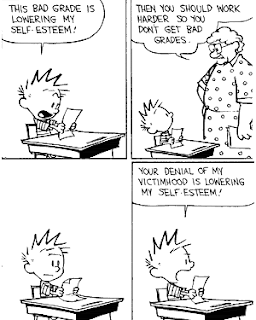 My last post spawned
a number of conversations (on and off line) which have lead me to question one
of my standard operating assumptions about the modern, western anthropology. I
remember growing up and being told that while we Christians believe that man is
basically evil, those foolish non-Christians believe that man is basically
good; that we start with different assumptions and that the other people’s
assumption was clearly ridiculous and most likely a product of wishful
thinking. That is not the operating assumption. Instead, I have assumed for the
last several years that nearly everyone (except Presbyterians) believes that
people are, by nature, somewhat good and somewhat evil. Granted not many of us
would use those terms, but I thought that most people would say that the
majority of the population have some goodness and some badness in them.
My last post spawned
a number of conversations (on and off line) which have lead me to question one
of my standard operating assumptions about the modern, western anthropology. I
remember growing up and being told that while we Christians believe that man is
basically evil, those foolish non-Christians believe that man is basically
good; that we start with different assumptions and that the other people’s
assumption was clearly ridiculous and most likely a product of wishful
thinking. That is not the operating assumption. Instead, I have assumed for the
last several years that nearly everyone (except Presbyterians) believes that
people are, by nature, somewhat good and somewhat evil. Granted not many of us
would use those terms, but I thought that most people would say that the
majority of the population have some goodness and some badness in them.
I’m not certain I
was right about that. I’m sure there are
many reasons but by limited and entirely anecdotal evidence would seem to
suggest that many people of all sorts of religious and philosophical
persuasions actually believe (or at least claim to believe) that the mass of
men are fundamentally good. Most of the reasoning I found behind this goes back
to either cultural or general ethical subjectivism. The claim seems to be that
we judge other’s actions to be bad because we have different ethical standards
(which are arbitrarily ingrained in us thanks to culture and our parents), but
that at the end of the day each person generally lives consistently with their own
ethical or moral views.
But this leaves me with something of a
dilemma. You see, I don’t live up to my own ethical or moral views. I see myself
as rather appallingly bad, and (per my last post) infinitely good. Generally we
treat good and evil as being mutually exclusive such that a thing can be good
only to the degree that it is not evil and evil only to the extent that it is
not good. And this approach makes sense since the two are contraries. But we
tend to then conclude that a person’s soul could be plotted on a sort of
morality number line. We tend to think of others and ourselves as this good or that evil. But I don’t believe that it actually works that way.
 Instead I think that
the human soul is incredibly good. It is glorious beyond anything we can currently
comprehend. And it has also gone very wrong. I tend to picture my own soul as
something like a diamond with pits and stains and scarring on it. The pits and
scratches can be ground off, the stains can be cleaned. Evil is not an equal of
good after all, as C.S. Lewis reminds us, and (I think) Augustine first pointed
out, evil is a parasite on good; it cannot exist in the absence of good. So the
soul is good but has become very bad. And now the task at hand is how can we be
fixed?
Instead I think that
the human soul is incredibly good. It is glorious beyond anything we can currently
comprehend. And it has also gone very wrong. I tend to picture my own soul as
something like a diamond with pits and stains and scarring on it. The pits and
scratches can be ground off, the stains can be cleaned. Evil is not an equal of
good after all, as C.S. Lewis reminds us, and (I think) Augustine first pointed
out, evil is a parasite on good; it cannot exist in the absence of good. So the
soul is good but has become very bad. And now the task at hand is how can we be
fixed?
Does this resonate
with any of you? Is there anyone else out there who is simultaneously aware
that you are glorious and good beyond understanding and simultaneously twisted,
warped and wretched? What do you think of mankind? Are we basically good or
basically evil? Or are those no longer meaningful terms to you?




